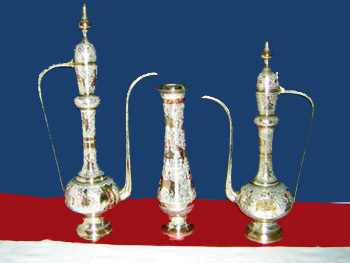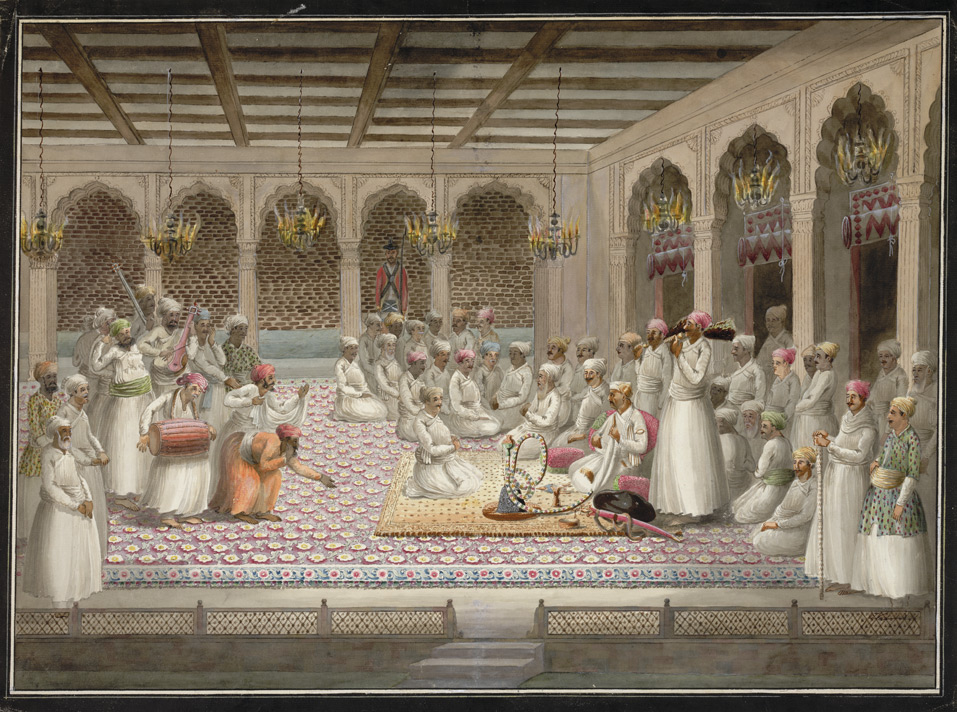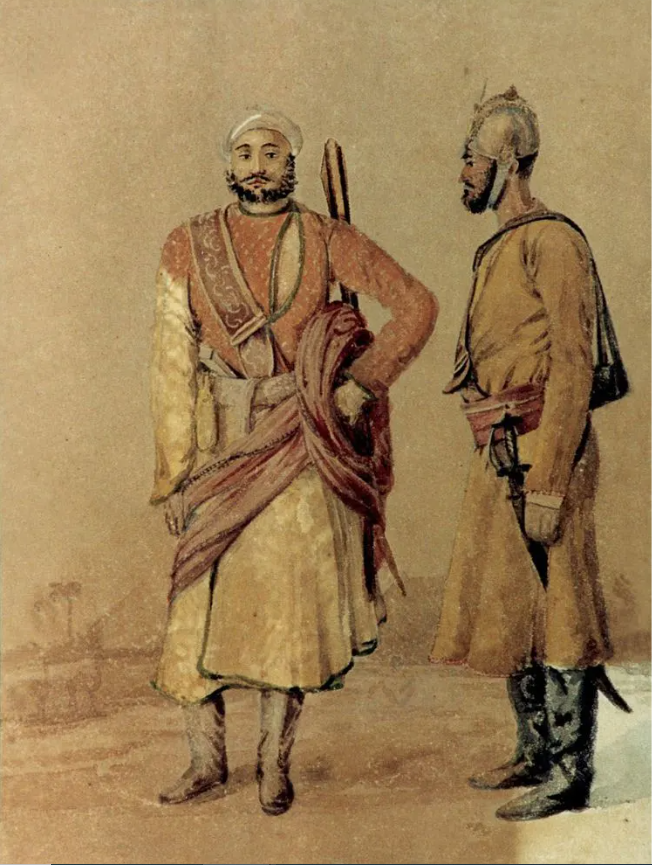|
Yusef Ali Khan Bahadur
Nawab Muhammad Yusef Ali Khan Bahadur, KSI, (5 March 1816 – 21 April 1865) was a Nawab of the princely state of Rampur from 1855 to 1865. During the First War of Independence, he rendered many useful services to the Government of India by keeping the British supply and communication lines to Naini Tal open, rescuing fugitives and securing the town of Moradabad. For his service, he was granted extensive lands in Bareilly by the Viceroy of India, Lord Canning, was knighted in 1861 and given a 13-gun salute along with the style of ''His Highness''. Finally, he was made a member of the Viceroy's Council. Despite this multitude of honours, Sir Yusef continued to preserve the Mughal artistic tradition by inviting musicians, scholars and artists of Bahadur Shah Zafar II's court to resettle at Rampur, including the great poet Ghalib. Dying at 49 in 1865, he was succeeded by his son, Sir Kalb Ali Khan Bahadur. Shortly before he died, the Yusef Ali Khan promoted the formation of the ... [...More Info...] [...Related Items...] OR: [Wikipedia] [Google] [Baidu] |
Nawab
Nawab (Balochi language, Balochi: نواب; ar, نواب; bn, নবাব/নওয়াব; hi, नवाब; Punjabi language, Punjabi : ਨਵਾਬ; Persian language, Persian, Punjabi language, Punjabi , Sindhi language, Sindhi, Urdu: ), also spelled Nawaab, Navaab, Navab, Nowab, Nabob, Nawaabshah, Nawabshah or Nobab, is a Royal title indicating a sovereign ruler, often of a South Asian state, in many ways comparable to the western title of Prince. The relationship of a Nawab to the Emperor of India has been compared to that of the Kingdom of Saxony, Kings of Saxony to the German Emperor. In earlier times the title was ratified and bestowed by the reigning Mughal emperor to semi-autonomous Muslim rulers of subdivisions or princely states in the Indian subcontinent loyal to the Mughal Empire, for example the Nawabs of Bengal. The title is common among Muslim rulers of South Asia as an equivalent to the title Maharaja. "Nawab" usually refers to males and literally mea ... [...More Info...] [...Related Items...] OR: [Wikipedia] [Google] [Baidu] |
Moradabad
Moradabad () is a city, commissionary and municipal corporation in Moradabad district of Indian state of Uttar Pradesh. Moradabad is situated on the banks of the Ramganga river, at a distance of from the national capital, New Delhi and 344 km north-west of the state capital Lucknow. Founded by Rustam Khan, the governor of Katehar under the Mughal emperor Shahjahan, Moradabad is named after prince Murad Bakhsh, the youngest son of the emperor. Soon after its establishment, the city replaced Sambhal as the seat of the governor of Katehar. Moradabad was subsequently annexed into the Kingdom of Rohilkhand by Ali Mohammed Khan in 1740. The city came under the control of Oudh State in 1774 after the fall of Rohillas in the First Rohilla War and was then ceded to the British East India Company by the Nawab of Oudh in 1801. In the early nineteenth century, the Rohilkhand area was divided among the Rampur State and two districts - Bareilly and Moradabad; Moradabad becam ... [...More Info...] [...Related Items...] OR: [Wikipedia] [Google] [Baidu] |
His Highness
Highness (abbreviation HH, oral address Your Highness) is a formal style (manner of address), style used to address (in grammatical person, second person) or refer to (in grammatical person, third person) certain members of a reigning or formerly reigning dynasty. It is typically used with a possessive adjective: "His Highness", "Her Highness" (HH), "Their Highnesses", etc. Although often combined with other adjectives honorific, of honour indicating rank, such as "Imperial", "Royal" or "Serene", it may be used alone. ''Highness'' is, both literally and figuratively, the quality of being lofty or above. It is used as a term to evoke dignity or honour, and to acknowledge the exalted rank of the person so described. History in Europe Abstract styles arose in profusion in the Roman Empire, especially in the Byzantine Empire, Byzantine. Styles were attached to various offices at court or in the state. In the early Middle Ages such styles, couched in the second or third person, were ... [...More Info...] [...Related Items...] OR: [Wikipedia] [Google] [Baidu] |
Nawab Of Rampur
Rampur State was a 15 gun-salute princely state of British India. It came into existence on 7 October 1774 as a result of a treaty with Oudh. Following independence in 1947, Rampur State and other princely states of the area, such as Benares and Tehri Garhwal were merged into the United Provinces. Rampur state had its capital in Rampur city and its total area was 945 sq miles. History The Rohilla War of 1774–75 began when the Rohillas reneged on a debt they owed to the Nawab of Oudh for military assistance against the Maratha Empire in 1772. The Rohillas were defeated and driven from their former capital of Bareilly by the Nawab of Oudh with the assistance of the East India Company's troops lent by Warren Hastings. The Rohilla State of Rampur was established by Nawab Faizullah Khan on 7 October 1774 in the presence of British Commander Colonel Champion, and remained a pliant state under British protection thereafter. Faizullah Khan was a leader among the Pashtuns. Hi ... [...More Info...] [...Related Items...] OR: [Wikipedia] [Google] [Baidu] |
Nawabzada
Nawab ( Balochi: نواب; ar, نواب; bn, নবাব/নওয়াব; hi, नवाब; Punjabi : ਨਵਾਬ; Persian, Punjabi , Sindhi, Urdu: ), also spelled Nawaab, Navaab, Navab, Nowab, Nabob, Nawaabshah, Nawabshah or Nobab, is a Royal title indicating a sovereign ruler, often of a South Asian state, in many ways comparable to the western title of Prince. The relationship of a Nawab to the Emperor of India has been compared to that of the Kings of Saxony to the German Emperor. In earlier times the title was ratified and bestowed by the reigning Mughal emperor to semi-autonomous Muslim rulers of subdivisions or princely states in the Indian subcontinent loyal to the Mughal Empire, for example the Nawabs of Bengal. The title is common among Muslim rulers of South Asia as an equivalent to the title Maharaja. "Nawab" usually refers to males and literally means ''Viceroy''; the female equivalent is "Begum" or "''Nawab Begum''". The primary duty of a Nawab was ... [...More Info...] [...Related Items...] OR: [Wikipedia] [Google] [Baidu] |
Oudh Commercial Bank
Oudh Commercial Bank or Awadh Commercial Bank was an Indian bank established in 1881 in Faizabad and operated until 1958 when it failed. It was the first commercial bank in India having limited liability and an entirely Indian board of directors. It was a small bank that had no branches and that served only local needs. History Before it failed it acquired the Bank of Rohilkund (or Bank of Rohilkhand), which Sir Yusef Ali Khan, Nawab of Rampur Rampur State was a 15 gun-salute princely state of British India. It came into existence on 7 October 1774 as a result of a treaty with Oudh. Following independence in 1947, Rampur State and other princely states of the area, such as Bena ... (1832–1887), had promoted over the objection of local moneylenders.''Indian Journal of History of Science'', 1982, Volumes 17-18, p.112. Bank of Rohilkund was established in 1862, just after the acceptance of limited liability for banks. Bank of Rohilkund was the first promoted by a princel ... [...More Info...] [...Related Items...] OR: [Wikipedia] [Google] [Baidu] |
Kalb Ali Khan Bahadur
Hajji Nawab Kalb Ali Khan Bahadur (1832 – 23 March 1887) was a Nawab of the princely state of Rampur from 1865 to 1887. Succeeding his father, Sir Nawab Yusef Ali Khan Bahadur, he continued his father's good works, expanding the Rampur library, constructing the Jama Masjid costing Rs.3 lakhs and encouraging the spread of education, irrigation, architecture, literature and art in general. A gifted ruler, Sir Kalb Ali Khan was highly literate in Arabic and Persian and patronised scholars from across India and the Islamic world. He was a member of John Lawrence's governance council from 1878 to his death, attended the Delhi Durbar of Queen Victoria and was granted a personal salute of 17-guns. He was succeeded at his death in 1887, aged 55, by his son, Muhammad Mushtaq Ali Khan Bahadur. Titles *1832-1865: Nawabzada Kalb Ali Khan, Wali Ahad Bahadur *1865-1872: His Highness 'Ali Jah, Farzand-i-Dilpazir, Mukhlis ud-Daula, Nasir ul-Mulk, Amir ul-Umara, Nawab Kalb Ali Khan Bah ... [...More Info...] [...Related Items...] OR: [Wikipedia] [Google] [Baidu] |
Ghalib
Mirza Beg Asadullah Khan (Urdu, fa, مرزا بیگ اسد اللہ خان; 27 December 1797 – 15 February 1869) also known as Mirza Ghalib (Urdu, fa}) was an Urdu and Persian language, Persian shayar (poet), poet of the 19th century Mughal Empire, Mughal and British Raj, British era in the Indian Subcontinent. He was popularly known by the pen name, pen names Ghalib (غالب) and Asad (اسد). His honorific was ''Dabir-ul-Mulk, Najm-ud-Daula''. He is one of the most popular poets in Pakistan and India. During his lifetime, the already declining Mughal Empire was eclipsed and displaced by the British East India Company Rule and finally deposed following the defeat of the Indian Rebellion of 1857; these are described through his work. He wrote in both Urdu and Persian language, Persian. Although his Persian Diwan (poetry), Divan (body of work) is at least five times longer than his Urdu Divan, his fame rests on his poetry in Urdu. Today, Ghalib remains one of the most popul ... [...More Info...] [...Related Items...] OR: [Wikipedia] [Google] [Baidu] |
Bahadur Shah Zafar II
Bahadur Shah II, usually referred to by his poetic title Bahadur Shah ''Zafar'' (; ''Zafar'' Victory) was born Mirza Abu Zafar Siraj-ud-din Muhammad (24 October 1775 – 7 November 1862) and was the twentieth and last Mughal Emperor as well as an Urdu poet. He was the second son and the successor to his father, Akbar II, who died on 28 September 1837. He was a titular Emperor, as the Mughal Empire existed in name only and his authority was limited only to the walled city of Old Delhi (Shahjahanbad). Following his involvement in the Indian Mutiny of 1857, the British exiled him to Rangoon in British-controlled Burma in 1858, after convicting him on several charges. Bahadur Shah Zafar's father, Akbar II, had been imprisoned by the British and he was not his father's preferred choice as his successor. One of Akbar Shah's queens pressured him to declare her son, Mirza Jahangir, as his successor. However, The East India Company exiled Jahangir after he attacked their resident in ... [...More Info...] [...Related Items...] OR: [Wikipedia] [Google] [Baidu] |
Mughal Era
The Mughal Empire was an early-modern empire that controlled much of South Asia between the 16th and 19th centuries. Quote: "Although the first two Timurid emperors and many of their noblemen were recent migrants to the subcontinent, the dynasty and the empire itself became indisputably Indian. The interests and futures of all concerned were in India, not in ancestral homelands in the Middle East or Central Asia. Furthermore, the Mughal empire emerged from the Indian historical experience. It was the end product of a millennium of Muslim conquest, colonization, and state-building in the Indian subcontinent." For some two hundred years, the empire stretched from the outer fringes of the Indus River, Indus river basin in the west, northern Afghanistan in the northwest, and Kashmir in the north, to the highlands of present-day Assam and Bangladesh in the east, and the uplands of the Deccan Plateau in South India. Quote: "The realm so defined and governed was a vast territory of ... [...More Info...] [...Related Items...] OR: [Wikipedia] [Google] [Baidu] |
Gun Salute
A gun salute or cannon salute is the use of a piece of artillery to fire shots, often 21 in number (''21-gun salute''), with the aim of marking an honor or celebrating a joyful event. It is a tradition in many countries around the world. History Firing cannons is a maritime tradition that dates back to the 14th century , when the cannon began to impose itself on the battlefields: a boat entering the waters of a country unloads its weapons and thus marks its intentions peaceful. The coastal batteries or the boats encountered then respond to this salute. If 7 cannon shots are fired at the start, corresponding to the number of guns on board a boat, in addition to the symbolism of the number seven, this number increases to 21, since it was considered that for a shot fired by a boat, the batteries land had enough powder for three rounds. 21-gun salute By type Naval cannon fire When a cannon was fired, it partially disarmed the ship until reloaded, so needlessly firing a cann ... [...More Info...] [...Related Items...] OR: [Wikipedia] [Google] [Baidu] |
Knight
A knight is a person granted an honorary title of knighthood by a head of state (including the Pope) or representative for service to the monarch, the church or the country, especially in a military capacity. Knighthood finds origins in the Greek ''hippeis'' and '' hoplite'' (ἱππεῖς) and Roman '' eques'' and ''centurion'' of classical antiquity. In the Early Middle Ages in Europe, knighthood was conferred upon mounted warriors. During the High Middle Ages, knighthood was considered a class of lower nobility. By the Late Middle Ages, the rank had become associated with the ideals of chivalry, a code of conduct for the perfect courtly Christian warrior. Often, a knight was a vassal who served as an elite fighter or a bodyguard for a lord, with payment in the form of land holdings. The lords trusted the knights, who were skilled in battle on horseback. Knighthood in the Middle Ages was closely linked with horsemanship (and especially the joust) from its origins in th ... [...More Info...] [...Related Items...] OR: [Wikipedia] [Google] [Baidu] |



.jpg)

.jpg)


